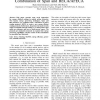122
click to vote
JNW
2008
15 years 2 months ago
2008
This paper presents some novel approaches for energy efficient routing in mobile ad-hoc networks. Two known energy preserving techniques, Span and BECA/AFECA, are combined with a w...
CORR
2007
Springer
15 years 2 months ago
2007
Springer
—In ad hoc networks scalability is a critical requirement if these technologies have to reach their full potential. Most of the proposed routing protocols do not operate efficien...
137
Voted
IJNM
2008
15 years 2 months ago
2008
Routing protocols for mobile ad hoc networks (MANETs) have been an active area of research for the last decade, with many very interesting potential as well as actual applications...
107
click to vote
CORR
2006
Springer
15 years 2 months ago
2006
Springer
Though appropriate for core Internet infrastructure, the Internet Protocol is unsuited to routing within and between emerging ad-hoc edge networks due to its dependence on hierarc...
118
Voted
CORR
2010
Springer
15 years 2 months ago
2010
Springer
Wireless sensor networks are collections of large number of sensor nodes. The sensor nodes are featured with limited energy, computation and transmission power. Each node in the n...
123
click to vote
AHSWN
2010
15 years 2 months ago
2010
The specific challenges of multihop wireles networks lead to a strong research effort on efficient protocols design where the offered capacity is a key objective. More specifically...
133
Voted
ICWN
2004
15 years 3 months ago
2004
A critical issue in the design of routing protocols for wireless sensor networks is the efficient utilization of resources such as scarce bandwidth and limited energy supply. Many ...
119
Voted
CSREASAM
2006
15 years 4 months ago
2006
A mobile ad hoc network is a self-organizing network that relies on the cooperation of participating nodes in order to function properly. In this network, mobile users arrive withi...
141
Voted
AISM
2004
15 years 4 months ago
2004
The exchange of routing protocol updates is used to ensure that routers using an Internal Gateway Protocol (IGP) in an Autonomous System (AS), or routers using an External Gateway...
133
click to vote
NETWORKING
2008
15 years 4 months ago
2008
Currently emerging standard routing protocols for MANETs do not perform well in presence of malicious nodes that intentionally drop data traffic but otherwise behave correctly with...

